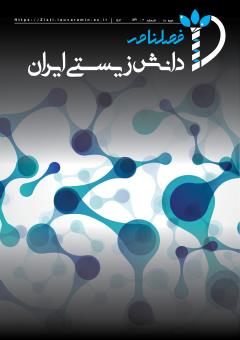اثر مکمل سلنیوم آلی بر میزان پذیرش لارو، مقدار ژله رویال تولیدی، وضعیت آنتی اکسیدانی بدن و بیان نسبی ژن hsp90 در زنبور عسل تحت تنش گرمایی
محورهای موضوعی : زیست شناسی جانوریخلیل رسولی-نادرگلی 1 , علی اصغر صادقی 2 * , پروین شورنگ 3 , محمد چمنی 4
1 - دانشجوی دکتری، گروه علوم دامی، واحد علوم و تحقیقات، دانشگاه آزاد اسلامی، تهران، ایران
2 - دانشیار، گروه علوم دامی، واحد علوم و تحقیقات، دانشگاه آزاد اسلامی، تهران، ایران
3 - دانشیار،گروه دامپزشکی و علوم دامی پژوهشکده کشاورزی سازمان انرژی اتمی، تهران، ایران
4 - استاد، گروه علوم دامی، واحد علوم و تحقیقات، دانشگاه آزاد اسلامی، تهران، ایران
کلید واژه: ژله رویال, ظرفیت آنتی اکسیدانی, بیان ژن, پروتئین شوک گرمایی, زنبور پرستار,
چکیده مقاله :
مقدمه: در فصول گرم سال و در مناطق گرمسیری لازم است به زنبور عسل مکمل هایی داده شود که مقاومت بدن آنها را به تنش گرمایی افزایش دهد. سلنیوم به دلیل داشتن نقش فعال در ساختمان و فعالیت آنزیم های آنتی اکسیدانی می تواند در این زمینه موثر عمل کند. انواع مکمل سلنیوم وجود دارد که فرم آلی آن زیست فراهمی بهتری دارد. هدف: پژوهش کنونی با هدف مطالعه اثرات مکمل سلنیوم آلی بر میزان پذیرش لارو، مقدار ژله رویال تولیدی، وضعیت آنتی اکسیدانی بدن و بیان نسبی ژن hsp90 در زنبور عسل تحت تنش گرمایی انجام شد. مواد و روش ها: تعداد 20 کلنی در منطقه دشت (کیانمهر کرج) و 20 کلنی به منطقه کوهستانی سنج (ساوجبلاغ) کوچ داده شد. آزمون فاکتوریل 2×2 در قالب طرح کاملا تصادفی اجرا شد و محل استقرار (دشت یا کوهستان) در دو سطح و شربت (فاقد یا حاوی 50 میکروگرم سلنیوم آلی در لیتر) در دو سطح و در ده تکرار اجرا شد. وزن بدن زنبورهای پرستار و درصد چربی وپروتئین بدن، کل ظرفیت آنتی اکسیدانی، غلظت مالوندیآلدئید و آنزیمهای آلانین آمینو ترانسفراز و آسپارتات آمینو ترانسفراز و بیان ژن پروتئین شوک گرمایی (hsp90) با تکنیک RT-PCR اندازهگیری شد. نتایج: کلنیهای مستقر در کوهستان و کلنیهای دریافتکننده سلنیوم آلی درصد بالاتری پذیرش لارو داشتند (P<0.05). مقدار ژله رویال تولیدی تحت تاثیر منطقه نگهداری کلنیها و افزودن مکمل سلنیوم آلی قرار نگرفت. زنبورهای پرستار در منطقه کوهستانی که شربت حاوی مکمل سلنیوم آلی دریافت کردند بیشترین ظرفیت آنتیاکسیدانی، کمترین غلظت مالوندیآلدئید و آنزیمهای ترانسفرازی داشتند و زنبورهای پرستار در منطقه دشت که شربت فاقد مکمل سلنیوم آلی دریافت کردند کمترین ظرفیت آنتیاکسیدانی، بیشترین غلظت مالوندیآلدئید و آنزیمهای ترانسفرازی را داشتند. (P<0.04). بیان ژن hsp90 در بدن زنبورهای مستقر در منطقه دشت 5/2 برابر بیشتر از منطقه کوهستانی بود و افزودن سلنیوم آلی در منطقه کوهستان بر بیان ژن بی تاثیر و در منطقه دشت اثر کاهندگی (30 درصد کاهش نسبت به زنبورهای دشت بدون مکمل) داشت. نتیجه گیری: نتایج این مطالعه نشان داد تنش گرمایی دارای اثرات نامطلوب بر ظرفیت آنتیاکسیدانی بدن زنبورهای پرستار است و بیشترین اثر منفی را بر میزان پذیرش لارو پیوند شده بر جای میگذارد. افزودن سلنیوم آلی با دوز 50 میکروگرم در لیتر شربت سبب افزایش میزان پذیرش لارو میشود که میتواند بر مقدار تولید ژله رویال موثر واقع شود.
Introduction: In the hot seasons and in tropical regions, it is necessary to feed supplements that increase honey bees tolerance to heat stress. Due to its active role in the structure and activity of enzymes, selenium has positive effects on heat tolerance. There are different types of selenium supplements, the bioavailability of organic form is higher than other forms. Aim: This study was done to evaluate the effects of organic selenium supplementation on larval acceptance rate, amount of royal jelly produced, antioxidant status of body and the relative expression of hsp90 gene in honey bees under heat stress. Materials and methods: 20 colonies were kept in the plain region (Kianmehr, Karaj) and 20 colonies were moved to the mountainous region of Senj (Saujbolag, Alborz Province). A 2x2 factorial trial was conducted based on completely randomized design, and the location (plain or mountain) and syrup (without or containing 50 µg of organic selenium per liter) considered as factor levels. The nurse bees' body weight, body fat and protein percentage, total antioxidant capacity, concentration of malondialdehyde, alanine transferase and aspartate transferase enzymes, and heat shock protein gene expression were measured using RT-PCR technique. Results: Colonies located in the mountains and colonies receiving organic selenium had a higher percentage of larva acceptance (P<0.05). The amount of royal jelly produced was not affected by the location and the organic selenium supplementation. The nurse bees in the mountainous region who received syrup containing organic selenium supplement had the highest antioxidant capacity, the lowest concentration of malondialdehyde and transferase enzymes, and the nurse bees in the plain region who received syrup without organic selenium supplement had the lowest antioxidant capacity and the highest concentration of malondialdehyde and transferase enzymes (P<0.04). The expression of hsp90 gene in the body of bees located in the plain region was higher (2.5 times) than in the mountain region, and the organic selenium supplemented in the mountain region had no effect on the gene expression, but in the plain region, it had a down-regulating effect (30% in comparison to bees not received supplement in plain). Conclusion: The results of this study showed that heat stress has adverse effects on the antioxidant capacity of nurse bees and has the most detrimental effect on the acceptance rate of grafted larvae. The selenium supplementation at dose 50 µg/L syrup increases the acceptance rate of larvae, which can affect the amount of royal jelly production.

